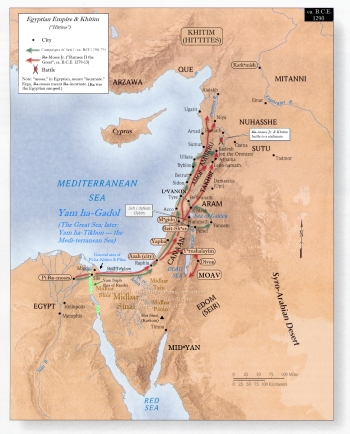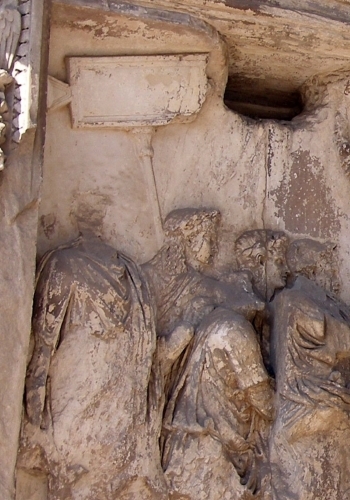
 |

 |
When Par•ohꞋ sent the am out of Mi•tzᵊraꞋyim, é‑‑ä would not relent to take the direct way back home to YᵊhūdꞋâh, through the territory of the Pᵊli•shᵊt•inꞋ, because their fighting-aged men had not yet been trained and battle-hardened into a blooded![]() military force capable of vanquishing the Pᵊli•shᵊt•inꞋ.
military force capable of vanquishing the Pᵊli•shᵊt•inꞋ.
Soft, unproven and naïve soldiers tend to compassionately spare the enemy – thereby getting themselves and their fellow soldiers killed, losing battles and wars. Moreover, there was a real danger they would simply turn and flee back to Mi•tzᵊraꞋyim.
Thus, Bᵊn•eiꞋ-Yi•sᵊrâ•eilꞋ began their a•liy•âhꞋ, fully-armed, from ërꞋëtz Mi•tzᵊraꞋyim.
 |
| Ma•khᵊt•âhꞋ, |
Accordingly, Bᵊn•eiꞋ-Yi•sᵊrâ•eilꞋ having taken the bones of Yo•seiphꞋ as they had promised him,![]() ël•oh•imꞋ diverted them to caravan along the Wilderness Way through Yâm Suph.
ël•oh•imꞋ diverted them to caravan along the Wilderness Way through Yâm Suph.
Every company was led by the bearers of their ma•khᵊt•âhꞋ,![]() carrying their fire aloft on a pole. During the day, everyone could see its column of smoke-cloud rising in front of them while, at night, they could see its column of fire glowing against the night sky.
carrying their fire aloft on a pole. During the day, everyone could see its column of smoke-cloud rising in front of them while, at night, they could see its column of fire glowing against the night sky.![]()
They perceived é‑‑ä to be walking![]() before them in the column of smoke-cloud and fire, guiding them along the dërꞋëkh. The column, whether smoke-cloud by day or fire by night, never disappeared from before the am.
before them in the column of smoke-cloud and fire, guiding them along the dërꞋëkh. The column, whether smoke-cloud by day or fire by night, never disappeared from before the am.
 |
Then é‑‑ä spoke to Mōsh•ëhꞋ saying,
“Speak to Bᵊn•eiꞋ-Yi•sᵊrâ•eilꞋ, that they return to bivouac — again — before Pi ha-Khir•ōtꞋ,
between Mi•gᵊdōlꞋ and ha-Yâm; before BaꞋal Tzᵊphōn. Bivouac opposite it, on the coast of ha-Yâm.
Then Par•ohꞋ will say about Bᵊn•eiꞋ-Yi•sᵊrâ•eilꞋ, ‘They've become confounded inside the country. They've trapped themselves between Yâm Suph, the Mediterranean Sea and the mi•dᵊbârꞋ!’
Thus, I will goad Par•ohꞋ to harden his heart, so that he will chase after them. Thereby, I will instill into Par•ohꞋ – and all of his warriors – respect for Me; so that the Mi•tzᵊraꞋyim shall know that I am é‑‑ä.”
So Bᵊn•eiꞋ-Yi•sᵊrâ•eilꞋ bivouacked in the northwest corner of the Sinai peninsula, adjacent to Egypt's eastern coastal border, as they had been instructed.

Optional parental preparation:
áÌÀòÅøÇú àÅùÑ (fire-making) in Antiquity— These events happened around the Middle Bronze Age 2c/3 (Southern Levant, including Kᵊna•anꞋ: Middle Bronze Age 2c (MBIIC = MBIII ca. BCE 1650–1516). ![]()
![]()
Questions you might anticipate that your child might raise and be prepared to discuss:
What is "fighting-aged"? A warrior?
What is "battle-hardened? Blooded?
What does "naïve" mean?
What does it mean to be "fully armed"?
What does "divert" mean?
What is a caravan? Why did people travel in caravans? (Ans: safety in numbers against road bandits and robbers at night)
What does "bivouac" mean?
What does "confounded" mean?
What does it mean to "harden the heart"?
What does "instill" mean?
What is a peninsula?
![]()
 |
 |